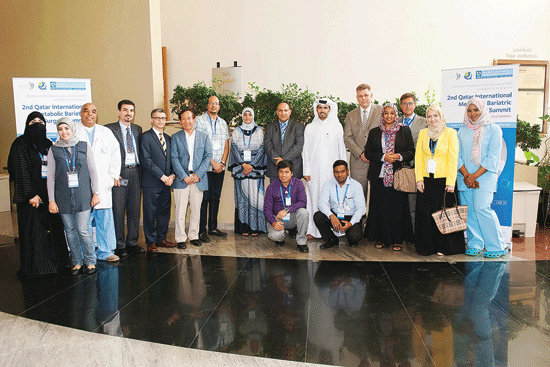
DOHA: Almost 30 percent of bariatric surgeries at Hamad Medical Corporation (HMC) are repeat weight loss surgeries, the second Qatar International Metabolic and Bariatric Surgery Summit (QIMBSS) heard. 
The increase in demand for revision surgery is due to two reasons, said Dr Moataz Bashah, HMC’s Director of Metabolic and Bariatric Surgery and director of the summit, which was held recently.
“The first reason is because patients not committed to proper diet and lifestyle changes after their initial weight loss surgery start developing problems again. The second reason is because many patients have previously undergone weight loss surgery in centres that have low professional standards, so they end up having complications,” he said.
However, Dr Bashah said that there is increasing public awareness about the need for a healthy lifestyle to combat obesity and related health complications. “We find more people nowadays who are committed to losing weight, choosing healthier foods and getting more physical exercise. We strive to raise awareness through different avenues, including reaching out to schools and universities to educate people on the health risks of obesity and I think the message is getting through to many people.”
More than 200 health care professionals gathered at the event where international and local experts discussed the latest developments and techniques in the management of revisional and complicated bariatric surgeries.
More than 30 percent of the Qatari population is morbidly obese, a serious health condition that can lead to early death. Bariatric surgery, a treatment that involves operating on the stomach and/or intestines, is an option for obese people who are unable to lose weight by other means or have serious obesity-related problems such as diabetes and cardiovascular disease. However, the long-term success of this procedure also depends largely on the commitment of the patient to the prescribed post-operative medication, diet and exercise regime.
The QIMBSS programme featured eight types of bariatric surgery techniques including the Stretta procedure, a unique endoscopic surgery used to treat gastroesophageal reflux disease (GERD) that significantly reduces symptoms and improves quality of life for patients. About 600 of more than 2,000 HMC patients who have undergone bariatric surgery have GERD (also known as acid reflux), a condition in which the stomach contents leak backwards into the esophagus, causing heartburn and other symptoms.
The Stretta procedure has so far been successfully used on three patients at HMC with severe symptoms that have not responded to medication. This technique provides an alternative to traditional surgery which is more invasive. The Peninsula




